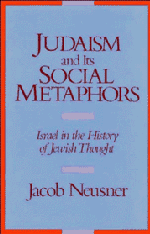Book contents
- Frontmatter
- Contents
- Preface
- List of Abbreviations
- Introduction
- 1 Imagining Society, Re-visioning “Israel”
- PART I “Israel” in the First Statement of Judaism, 70–300 C.E.
- PART II “Israel” in the Second Statement of Judaism, 300–600 C.E.
- PART III Same Metaphors, Other Systems
- General Index
- Index to Biblical and Talmudic References
- Frontmatter
- Contents
- Preface
- List of Abbreviations
- Introduction
- 1 Imagining Society, Re-visioning “Israel”
- PART I “Israel” in the First Statement of Judaism, 70–300 C.E.
- PART II “Israel” in the Second Statement of Judaism, 300–600 C.E.
- PART III Same Metaphors, Other Systems
- General Index
- Index to Biblical and Talmudic References
Summary
When, to explain who they are, several people or families who live in a village call themselves “villagers,” or “people who live in such-and-such a village,” they speak of the simple, palpable facts of their everyday life. But when they call themselves “Israel,” and mean by that the same group of which the Hebrew Scriptures or “Old Testament” speaks, they claim for themselves a standing and a status that the simple facts of daily life do not, and cannot, validate. They compare themselves to some other social group and allege that they are like that other group or continue it or embody it in the here and now. In so doing, they evoke in explaining who they are what we may call a metaphor. For the statement, “we are Israel,” means to allege, “we are like that Israel of old” of which the Scriptures speak. The same is so when Christian residents of a given locale call themselves “the Church,” or “the body of Christ.” Then they speak of what is not seen, though very real. In both of these cases, the claim that “we” are “Israel,” or “we” are “the body of Christ,” forms instances of metaphors invoked to explain the character and standing of a social entity. Social metaphors, therefore, refer to the things with which a group of people compare themselves in accounting for their society together.
- Type
- Chapter
- Information
- Judaism and its Social MetaphorsIsrael in the History of Jewish Thought, pp. 1 - 7Publisher: Cambridge University PressPrint publication year: 1989



